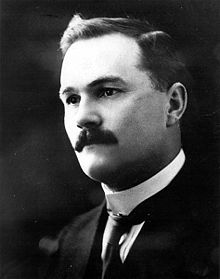Charles A. Dunning
| Charles Avery Dunning | |
|---|---|
 |
|
| 3rd Premier of Saskatchewan | |
|
In office April 5, 1922 – February 26, 1926 |
|
| Monarch | George V |
| Lieutenant Governor | Henry William Newlands |
| Preceded by | William Melville Martin |
| Succeeded by | James Garfield Gardiner |
| Member of the Legislative Assembly of Saskatchewan for Kinistino | |
|
In office November 13, 1916 – June 26, 1917 |
|
| Preceded by | Edward Devline |
| Succeeded by | John Richard P. Taylor |
| Member of the Legislative Assembly of Saskatchewan for Moose Jaw County | |
|
In office June 26, 1917 – February 26, 1926 |
|
| Preceded by | John Edwin Chisholm |
| Succeeded by | Thomas Waddell |
| Member of the Canadian Parliament for Regina |
|
|
In office March 16, 1926 – July 28, 1930 |
|
| Preceded by | Francis Nicholson Darke |
| Succeeded by | Franklin White Turnbull |
| Member of the Canadian Parliament for Queen's |
|
|
In office December 30, 1935 – March 26, 1940 Serving with Peter Sinclair |
|
| Preceded by | J. James Larabee |
| Succeeded by |
Cyrus MacMillan James Lester Douglas |
| Personal details | |
| Born |
July 31, 1885 Croft, Leicestershire, England |
| Died | October 1, 1958 (aged 73) Montreal, Quebec |
| Political party | Saskatchewan Liberal Party |
| Other political affiliations |
Liberal Party of Canada |
| Religion | United Church |
| Signature | |
Charles Avery Dunning, PC (July 31, 1885 – October 1, 1958) was a Canadian businessman, politician (both federal and provincial), and a university chancellor. He was born in Croft, Leicestershire, England.
Known throughout his life as "Charlie", Dunning, a 17-year-old iron worker, followed a friend's advice and traveled to Canada to work as a farm hand. Satisfied that a permanent move to Canada made sense, he convinced the remainder of his family to come to East Central Saskatchewan. Dunning filed for a homestead in the Beaverdale district, west of Yorkton.
During his short career as a farmer, Dunning was involved in the local of the Territorial Grain Growers' Association, an early proponent of a farmer-owned cooperative grain marketing system. At his first general meeting of the Association, Dunning's enthusiasm was apparent, and he was promptly elected as a director. The following year, he was elected as vice-president of the Association.
A co-operative marketing system required physical assets. The Association convinced the Saskatchewan government to assist by incorporating the Saskatchewan Co-operative Elevator Company, and provide it with limited financial backing. Dunning was appointed a provisional director of a Board that had only a few months to raise the necessary capital to build a line of rural grain elevators. At age 25, the youngest man on the Board, Dunning watched as each one of his seniors turned down the critical job of organizing the capital campaign. Dunning took the job and succeeded. The following year, in 1911, he was rewarded for his efforts by being named the first general manager of the Company. Four years later, it was the largest grain handling company in the world. As manager, Dunning was instrumental in developing a provincial hail insurance scheme, which survives today as Saskatchewan Municipal Hail Insurance.
Dunning's interests turned to politics. The Liberal government of Walter Scott, Saskatchewan's first premier, was tainted with allegations of corruption. Traditional politics were being challenged, as farmer's movements had become politically active, creating political parties throughout Canada.
...
Wikipedia
